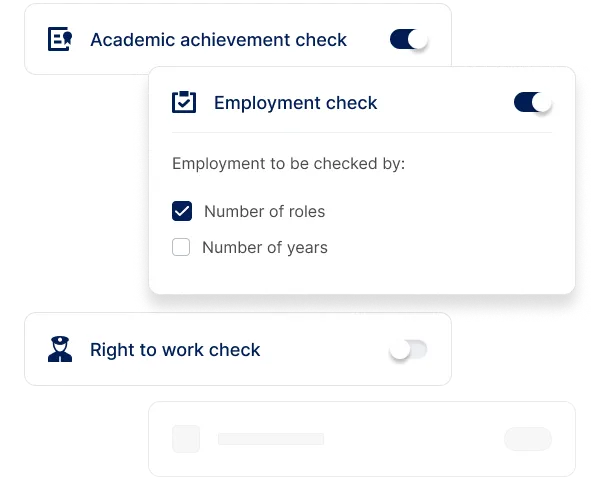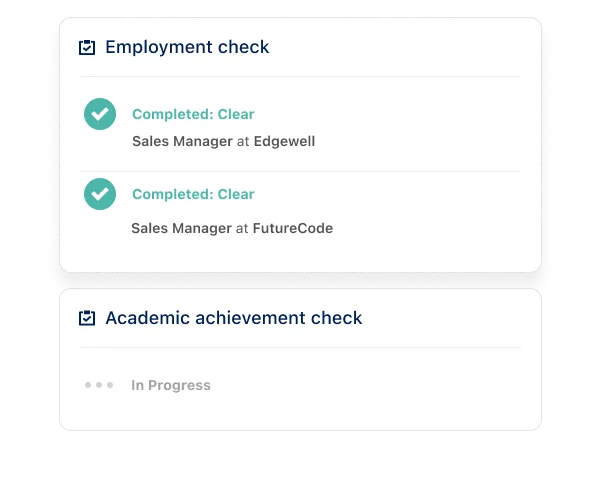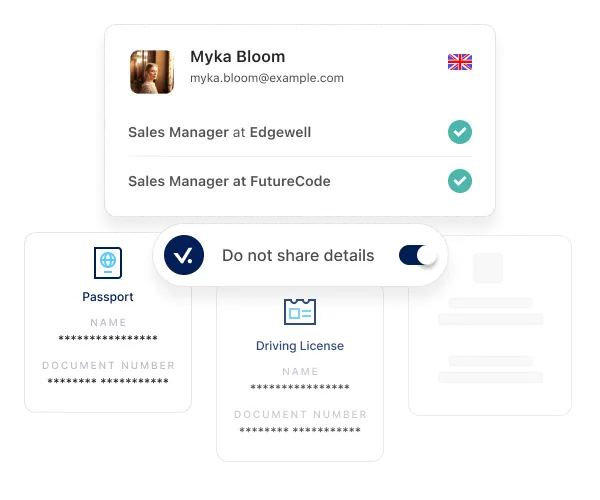Take a deep dive into your candidate’s employment history

Employment history checks - get the full picture
While a candidate may look impressive on paper, there is a risk that the CV may contain more than a little exaggeration. From elevated job titles to extended tenures - it’s often a good idea to verify an individual’s employment history.
By getting an insight into your candidate’s employment past, you’re more equipped to define, understand and manage hiring risks, and proceed with confidence.
Our employment history checks look at the:
- Type of employment held
- Duration of employment held
- Role held
- Employer name
- Reason for leaving
- Previous line managers
- Bonuses and other financial rewards relevant
Trusted by the world's best workplaces






PROVEN
.png)
.png)




and Loved by reviewers
Easy
Reduce risk
No lock-in
Global checks
24/7 support
Faster time to hire
With our award-winning software, we’re the number one choice for leading brands and workplaces all over the world.
An employment history check can give you the peace of mind that the person you’ve shortlisted could be the right hire for your organization. Veremark searches against databases and contacts past employers to verify the entire history of a candidate.
How it works



Related checks
FAQs
Employers have the right to ask for work history, salary history, education history, and any other relevant information that is related to the position they are hiring for. They also have the right to conduct criminal background checks and drug tests. However, employers cannot discriminate against applicants or employees based on race, color, sex, religion, national origin or disability status in any aspect of employment.
The answer to this question will vary depending on the industry. Some industries are more likely to check a new hire’s employment history than others. For example IT, healthcare and fintech/financial industries , it is very common for employers to perform an employment history on a new hire. The main reason for this is because these industries require a lot of specific knowledge that can only be acquired through training or experience. These companies want to make sure that their employees have the necessary skill set before they start working there.
Companies are increasingly using automated background screening software to verify employees past employment history. This is because there has been an increase in the number of applicants applying for jobs online. This is why big companies are using intelligent software to check past employment records. These tools can scan a large amount of data.
Due to the increasing number of applicants applying for jobs online, companies are increasingly using automated background screening software to verify employees' past employment history. They use these tools because they can scan a large amount of data.
Employers use a lot of tools and methods to check employment history. They can do it through online databases, social media, and word-of-mouth referral. In social media, the most popular method of checking employment history is through online databases such as LinkedIn. Employers also look at social media platforms like Facebook to see what kind of information they have on an applicant’s profile or posts. However, in order to save a lot of time, most employers are hiring background check companies who are experts on this type of check.
These background checks can be done by contacting previous employers and asking them about an individual’s work history, education, and skills. However, there are some instances that this might not be enough to ensure that an individual is qualified for the job position. This is where expertise of background checking companies comes into play.
Employment history checks are not the same thing as reference checks. They involve verifying the entire employment history of a candidate to create a detailed account of employment.
Past employers will be contacted to confirm key information such as dates, role title and salary.
The following are the typical type of information that can be released:
- Type of employment held
- Length of employment held
- Type of role held
- Name of previous employer
- Reason for leaving
- Names of previous line managers
- Incentives, bonuses and other relevant financial rewards
There are many ways to find out employee employment history, the best way to do this is by contacting their previous manager or employer or using the appropriate database.
Candidates must provide their permission for employment history checks to be carried out.
Any gaps in employment should be subject to gap analysis to determine the reason for the gap, and whether or not it is a cause for concern.
Employment history checks and reference checks are often bundled together to provide a complete picture of a candidate’s employment history. Results of employment history checks can help verify other information uncovered throughout the background screening process.
Background checks typically look at employment history because it is one of the best indicators of a person's past behavior. Employers also use background checks to make sure that employees have been honest with their previous employers about their past work experience. This helps employers avoid hiring someone who has been fired or laid off from a previous employer for misconduct.
Transform your hiring process
Request a discovery session with one of our background screening experts today.






